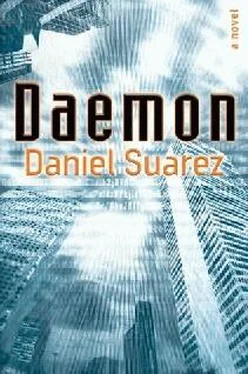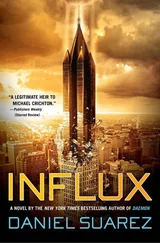Heider’s body had been found in a rail yard near Hobby Airport, south of Houston. Heider had been bound, gagged, and beaten to death—left as a warning to the carder community. It was at times like these that Gragg was thankful for his limited social circle.
Few, if any, would be able to connect him to Heider, but just in case he decided to lay low for a few weeks.
He had about fifty or sixty thousand in cash on hand at various banks under various identities. Good thing, because he couldn’t trade the identity database he had copied from the Filipino server with any of his Abkhazian contacts. It was just too hot. He felt a wave of humiliation again. Over twenty thousand high-net-worth identities down the drain—a fortune on the open market. How did they know it was him?
Gragg had cracked their database through a Unicode directory traversal that allowed him to install a back door on their Web server. They hadn’t properly patched it, and the sample applications were still on the server, so it was a fairly trivial matter to gain Administrator rights. He was pretty certain that a network admin was lying at the bottom of Manila Harbor over that simple mistake.
But how the hell did they trace the hack to him? Gragg ran the exploit through a zombied machine somewhere in Malaysia and a hijacked 803.11g wireless connection in a Houston subdivision. Even if they tracked the file transfer to the destination IP address, how did that lead them back to him? Even if they beat the hell out of the poor suburban sap whose Wi-Fi access point he’d hijacked, that wouldn’t tell them anything. Nonetheless, Gragg had spent a couple sleepless nights waiting for his front door to be kicked in while pondering the question. He just couldn’t figure it. What had he missed?
Only recently did it occur to Gragg that he might have been the Filipinos’ only partner in Houston. By staging the attack from a Houston domain, Gragg had made a pathetically obvious mistake. The carder, Loki, from Houston, Texas, was an obvious suspect.
But as the days slipped by, it became apparent that either the gang was satisfied that Loki was dead or they had no idea of Gragg’s real identity. Until he was positive, Gragg spent his waking hours hiding in the rough industrial space that served as his apartment, playing endless hours of OTR. And OTR was quite a challenge, after all.
Gragg usually chose the Nazi side, and his preferred weapon was the sniper rifle, which he’d use to pick off newbies from a hiding place in a bell tower or garret window. He combined this with a liberal amount of verbal abuse, using hot keys to launch the taunts built into the game: I’ve seen French schoolgirls shoot straighter!
His cable Internet connection usually gave him a ping in the 20-to 50-millisecond range, which was a major advantage against lamers with pings of 150-plus. Their in-game avatars would hesitate as Gragg dropped them. He never tired of piling up the bodies in front of his hiding place.
Deathmatch OTR was a distributed network game—that is, one of the players hosted the game map off of his machine and made the match available for anyone to join over the Internet. There were deathmatch clients available that listed all available matches by geographical region—each machine sending out a message that it was available. The server listings numbered in the thousands.
Since Gragg had been playing OTR off and on for the last six months—well before the Filipino problem—he was intimately familiar with every game map. He knew that if he tossed a potato masher grenade from the end of the park in the Saint-Lô map, it would land just behind the vegetable cart on the far end, killing anyone hiding there. He knew a place on the Tunisian map where he could jump up onto shattered rooftops and snipe people with impunity. It took an experienced jumper to make the leap without falling to his death off the balcony.
Frankly, deathmatch had begun to lose its luster until CyberStorm released the custom map editor. Since then, a score of popular custom maps had appeared in the deathmatch server listing. Most of these maps were the out-of-control Rambo fantasies of fourteen-year-old boys, with ridiculous numbers of mounted machine guns and no logic in the placement and design of fortifications. Gragg knew he could do much better, but he didn’t have the inclination to learn the scripting language used to create the maps—no money in it.
So it was with low expectations that Gragg downloaded a new custom map named Monte Cassino. The reasonably historic name was unusual, since the fourteen-year-old crowd usually named maps something like “Fuckmeister Shitfest.”
Gragg quickly found a server named Houston Central running the Monte Cassino map. Since it was geographically local, it gave him a killer ping of twenty milliseconds, and he joined the deathmatch already under way.
The moment the map loaded, he noticed differences from other custom maps. First off, he wasn’t even allowed to join the Axis team. The map permitted Internet team play only for the Allied forces. The Germans were bots. It was humans against the AI, which irked Gragg because he loved playing the German side—they were the villains, after all.
Likewise, respawning was different in this map. It wasn’t a straight team match, where you respawned elsewhere after dying. Instead it was described as an “objective” map, where you stayed dead until the last member of your team died or until you defeated all the Germans—at which point the map reset and everyone was alive again.
Also, this map had radically different terrain and textures—as though it was all done from scratch. The map consisted of a steep mountain topped by the ruins of a large Benedictine monastery. The scenario description said U.S. heavy bombers had struck the monastery. The resulting ruins turned out to be a maze of shattered walls, charred wooden beams, and entrances to cellars. It provided excellent cover for the Germans, and the designer placed MG42s with interlocking fields of fire along the approaches to the hilltop. The Germans also had light mortars to kill you if you hid behind boulders. It was as if they’d “registered” the coordinates of all the good cover in advance—which was something the Germans might actually do. As a result, Gragg was determined to beat it.
It was quickly apparent that a pack of lone gunmen could not take the monastery. It required an orchestrated attack. It took an hour of goading other teammates using the chat window, but Gragg finally convinced them to coordinate their attack—instead of running hell-bent for leather up the hill. With some experimentation, they soon discovered that half the squad could draw fire from the Krauts while the other half of the force outflanked them on the left, using the steeper incline for cover. If they ran, they’d be spotted and cut down, but if they crawled on their bellies, they could usually get to within grenade-tossing distance of the outer fortifications. Once the grenades exploded, they’d charge into the ruins and the rest of the battle would be room-to-room fighting.
By this time, the squad distracting the Germans would be mostly dead from mortar rounds and heavy machine guns, so they couldn’t contribute much. It was a tough slog, and Gragg was still at it two days later. He hadn’t slept and had eaten very little, but he would not disconnect from the Houston Monte Cassino server without beating this map. The closest he’d come had been yesterday, when he made it into the wine cellars. There, an SS officer shot him in the back after Gragg raced past a row of wine tuns.
This was what had driven Gragg for the last twenty-four hours straight: After shooting him, the SS officer stood over his body. It was the infamous Oberstleutnant Heinrich Boerner from the single-player mode of OTR. Even freakier, Boerner spoke over Gragg’s body. He said: “ Tod ist unvermeidlich, aber meist unbeutend, ” with an English subtitle appearing on the bottom of the screen: “Death is inevitable but largely unimportant.”
Читать дальше












